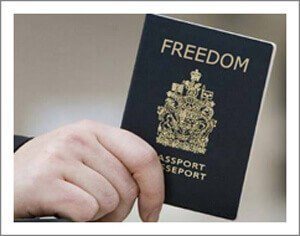New to Offshore? Here’s how to get started…
If you’re new to the offshore world, or just wondering what your options are, here’s an introduction to  going offshore. There are plenty of legal ways to go offshore. So long as you file the necessary forms and work with a firm that provides US tax compliance, going offshore will be safe and efficient.
going offshore. There are plenty of legal ways to go offshore. So long as you file the necessary forms and work with a firm that provides US tax compliance, going offshore will be safe and efficient.
Here are a few suggestions on how to plant your flag offshore and how we can help.
Open a Bank Account Offshore – Plant Your First Flag Abroad
The simplest way to gain experience in the offshore world is to open a bank account. There are a number of international banks that accept US persons. Services range from advanced investment and trading facilities to simple checking accounts. Some allow you to open an account by courier and some require you to visit their offices.
In it’s simplest form, an offshore account allows you to build a beachhead offshore. Put some of your cash abroad for a rainy day. Add to that an account held in a foreign currency, and you create a hedge against a weakening of the dollar. Combine this with a gold storage account and you have a solid offshore foundation and a place to land if necessary.
Accounts can be opened under your name or a corporation or LLC. Adding a structure to the mix increases privacy and protection, but you can plant that first flag… get your feet wet as it were… with a personal account.
For a list of banks we recommend, send an email with your account size and the investments you would like to have available to info@premieroffshore.com. If you want to start with a personal account, we will point you in the right direction. All of our formation services include opening bank and brokerage accounts.
Take Control of Your Retirement and Move Your IRA Offshore
Often the first major step in to the offshore world is to take control of your retirement account and move it out of the United States. If your IRA, 401k or defined benefit plan has vested, or is from a previous employer, you have the right to take control over that account and invest it in just about anything you like.
Whether you’re concerned with privacy, the possibility of government confiscation, or just want to increase your returns and diversify your investments, taking your IRA offshore is a quick and easy way to plant your flag offshore.
For more information, a personalized quote, and information on the banks and brokerages we work with, drop me a note to info@pemieroffshore.com.
Here are a few of my posts on this topic:
- The Self Directed IRA
- How to Buy Gold in Your IRA
- The IRS can Seize Your IRA
- Buy What You Know with an Offshore IRA (commentary)
Protect Your Assets with a Foreign Trust or Foundation
Once your retirement account is out of harm’s way, you might consider placing the rest of your savings behind a protective barrier. That’s what offshore asset protection is all about… moving your assets behind a wall… a fortress guarded by archers and cannons… that can’t be breached by any civil creditor. The height and complexity of that fortress is up to you and depends on the level of risk (probability of litigation) balanced against the amount of capital being protected.
Asset protection is not hiding your cash in some banana republic or simple secrecy. It’s about devising a custom strategy that fits your needs and keeps your savings safe from future creditors. Even if those creditors have a map of your castle, they’ll have no way to scale the walls.
In most cases, offshore asset protection is tax neutral. You should not pay any more or any less US taxes because you’ve diversified and taken steps to protect whats yours.
One of the exceptions to this rule is that offshore asset protection can reduce or eliminate your US estate tax (death taxes). In certain cases, contributing your assets to a foreign trust moves them out of your US estate. If your total estate is over $5.43 million in 2015, an offshore trust or foundation might save you (or your heirs) on estate taxes.
And there are other exceptions to this rule. Advanced asset protection systems that include captive insurance companies and/or offshore life insurance contracts can reduce your US taxes by hundreds of thousands of dollars a year or more. These advanced planning options typically require an investment of $1 to $3 million or the need to shelter at least $1 million per year in active business income.
For the basics of offshore trusts and foundation, please see my International Trusts page. For information on this and other more advanced techniques, please send an email to info@premieroffshore.com.
Second Passports and Foreign Residency Options
Record numbers of Americans renounced their citizenship in 2015… 1,335 during the first quarter alone. Expatriations have nearly doubled from the first quarter of 2014 and are up 10 fold from the early 2,000’s when the US began it’s attack on expats and international investments.
If you’re considering giving Uncle Sam the boot, or just want a backup travel document should the stuff hit the fan, then a second passport is for you. Remember that you must have a new passport in hand before giving up your US citizenship.
There are two paths to a second passport. You can buy a passport from countries like St. Kitts, Austria, and Comoros (see my 10 Best article below for a full list). If you don’t have the cash, you can become a resident of countries like Panama and Paraguay for a few years and then apply for citizenship. The cash for passport program is quick and easy but expensive. The residency path is slow and steady with minimal costs.
Here are a few of my posts on second passports:
- 10 Best Second Passports
- Russia’s Second Passports Program
- Should I Give my Son a US Passport? (commentary)
- How to Give up US Citizenship
- New Life New Passport
Buy Real Estate in Growth Markets
One of the best ways to diversify your assets is to invest in foreign real estate. Property is tangible, you typically receive payments in a foreign currency, appreciation is not taxed, there are a number of high growth markets available to American investors, and you might not be required to report international real estate to the IRS (see link below).
We can create a holding company and put you in contact with real estate experts around the globe. The key to high returns in growth markets is local knowledge… don’t pay the “gringo price,” negotiate like a local.
For example, Nicaragua is expected to be one of the hottest markets from 2016 to 2020. For the reason why, see Follow the Smart Money into Nicaragua (on EscapeArtist.com). For my thoughts on the Panama market, see Panama, 2015 and Beyond.
Here are a few of my other posts on international real estate:
- US Tax Breaks for Offshore Real Estate
- How to Finance Real Estate Overseas
- Using Your IRA to Buy Foreign Real Estate
- Do I Need to Report my Foreign Real Estate?
- Taxation of Foreign Real Estate
Start a Business Abroad and Pay Zero Taxes
If you can take you and your business offshore, and qualify for the Foreign Earned Income Exclusion, then you can run a business and pay zero US taxes. Assuming you operate from a country like Panama that won’t tax your foreign sourced income, you might pay zero worldwide tax.
I have a number of articles on this topic, but the basics are that you need to be out of the US and operating your business through a foreign corporation setup in a country that won’t tax your profits. The most important component of this plan is that you qualify for the Foreign Earned Income Exclusion.
Here are my posts on how to start a business abroad:
- Best Offshore Company Jurisdictions
- Foreign Earned Income Exclusion 2015
- Benefits of an Offshore Company
- Offshore Corporation vs LLC
- The Modern Road Warrior (commentary on EscapeArtist.com)
For more information on moving your business offshore, please send an email to info@premieroffshore.com.
Offshore Merchant Account
The US has the cheapest and best credit card processing, period.
But, if you’re going to be offshore, you should go all the way, right?
If you can structure your business with an offshore bank account and merchant account, you will reduce your exposure to the US government and the risks of the IRS seizing your cash. You will increase privacy and protection for your business. This security comes at a cost, but it may be well worth it.
We can help you structure your business offshore and open bank and merchant accounts. If you wish to keep processing in the US, we can help you there as well. You will need a US corporation and merchant account added to your offshore structure. Of course, this means your US corporation will file a US return. It also adds a level of complexity to your accounting and tax planning.
For more information on offshore merchant accounts see my article How to Get an Offshore Merchant Account. This 9 page report will tell you more than you ever wanted to know about the credit card processing industry.
US Tax Preparation & Compliance
We offer tax preparation and planning for all levels of international investors. Whether you have a advanced trust and company structure, a simple single member LLC, or foreign real estate and assets that need to be reported, we can assist.
For a confidential quote to prepare your current year tax returns, send an email to info@premieroffshore.com, along with a copy of last year’s return.
We also provide a ton of tax research on this site, which is intended to help you plan your structures and investments, but not necessarily prepare your returns… we don’t update our posts with changes to the code unless a major law comes along that affects future planning.
Tax rules, rates and forms are constantly changing. The US tax code is over 4,000 words long and there’ve been over 5,000 changes since 2001. My International Tax and Business Guide (2015, 6th edition) tracks these changes and is updated for each tax filing season.
To receive your free copy of my 120 page book please sign up for my free e-letter. I’ll send it to you as a PDF immediately.
To receive your free copy of my 120 page book please enter your email address below. I’ll send it to you as a PDF immediately.
[contact-form-7 id=”2719″ title=”US Tax Preparation & Compliance”]
IRS Audits and Tax Debt
The IRS has found it very profitable to go after international accounts and has gone to great lengths to target Americans abroad. The is the reason I created Premier – to offer legal and tax compliant options to Americans living, working, and investing abroad.
To many of my readers have been taken in by unscrupulous offshore incorporators. These scammers are not subject to US rules and provide little or no advice on the topic… and, those that do offer “guidance,” often tell you what you want to hear just to make the sale.
Unfortunately, the IRS doesn’t care why you didn’t file your forms on time… they just want to take as much of your hard earned money as possible and put another pelt on the wall.
If you’re behind in your filings, or being audited, we can help. Our team of experts have decades of experience in dealing with the IRS and can settle your tax controversy in the most efficient manner possible.
One option for those living abroad is the Offshore Voluntary Disclosure Program. If you qualify, you might be eligible to file your missing forms, get right with your government, and pay no penalties.
For more information, see: 2014 IRS Settlement Program – I am writing this post in May of 2015 and the 2014 IRS program is still in effect. However, it may be modified or canceled at any time.
You might also take a read through: Prepare for an Offshore IRS Audit and Offshore Basics, What’s Legal and What’s Not
If you are a glutton for punishment, and want to read my articles on doing battle with the IRS, checkout the tax portal at EscapeArtist.com. There you will find over 40 posts on dealing with the great collector.
Note: Premier is not a law firm. If you’re being targeted by the IRS Criminal Investigation Division, or have been charged with a crime, you need a lawyer. Send a brief email to info@premieroffshore.com and I’ll put you in touch with a tax attorney who specializes in IRS criminal matters.



 Businessman with ideas for success planning has allowed these companies to legally stash billions offshore and out of the reach of the IRS.
Businessman with ideas for success planning has allowed these companies to legally stash billions offshore and out of the reach of the IRS.



 Here’s why the Panama Foundation is the ticket for those wanting to diversify abroad and protect their savings.
Here’s why the Panama Foundation is the ticket for those wanting to diversify abroad and protect their savings.
 Wealthy Now Available to the Average Investor
Wealthy Now Available to the Average Investor 




 business profits abroad? Moving your business offshore? We can help you structure your business, banking and credit card processing offshore.
business profits abroad? Moving your business offshore? We can help you structure your business, banking and credit card processing offshore.
 The world of offshore banking is a diverse and complex landscape of licensing, compliance, correspondents, and regulation. Bottom line is that the barriers to entry have increased significantly in the last 4 years.
The world of offshore banking is a diverse and complex landscape of licensing, compliance, correspondents, and regulation. Bottom line is that the barriers to entry have increased significantly in the last 4 years.








